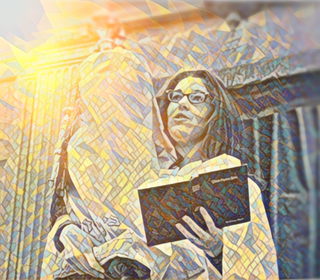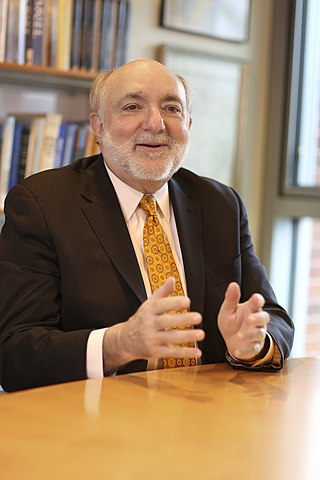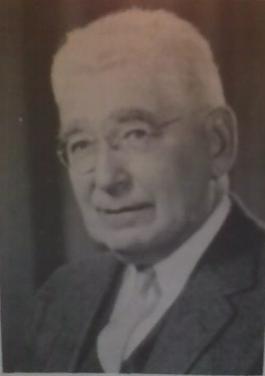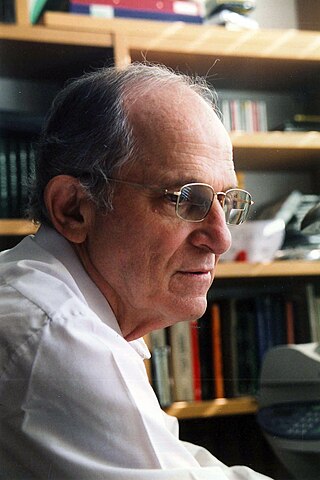Related Research Articles

Reform Judaism, also known as Liberal Judaism or Progressive Judaism, is a major Jewish denomination that emphasizes the evolving nature of Judaism, the superiority of its ethical aspects to its ceremonial ones, and belief in a continuous revelation which is closely intertwined with human reason and not limited to the theophany at Mount Sinai. A highly liberal strand of Judaism, it is characterized by little stress on ritual and personal observance, regarding Jewish law as non-binding and the individual Jew as autonomous, and by a great openness to external influences and progressive values.
The Union for Reform Judaism (URJ), known as the Union of American Hebrew Congregations (UAHC) until 2003, founded in 1873 by Rabbi Isaac Mayer Wise, is the congregational arm of Reform Judaism in North America. The other two arms established by Rabbi Wise are the Hebrew Union College-Jewish Institute of Religion and the Central Conference of American Rabbis. The current president of the URJ is Rabbi Rick Jacobs.

The Hebrew Union College – Jewish Institute of Religion is a Jewish seminary with three locations in the United States and one location in Jerusalem. It is the oldest extant Jewish seminary in the Americas and the main seminary for training rabbis, cantors, educators and communal workers in Reform Judaism. HUC-JIR has campuses in Cincinnati, Ohio, New York City, Los Angeles, and Jerusalem. The Jerusalem campus is the only seminary in Israel for training Reform Jewish clergy.

Sally Jane Priesand is America's first female rabbi ordained by a rabbinical seminary, and the second formally ordained female rabbi in Jewish history, after Regina Jonas. Priesand was ordained by the Hebrew Union College-Jewish Institute of Religion on June 3, 1972, at the Plum Street Temple in Cincinnati. After her ordination she served first as assistant and then as associate rabbi at Stephen Wise Free Synagogue in New York City, and later led Monmouth Reform Temple in Tinton Falls, New Jersey from 1981 until her retirement in 2006. She is featured in numerous books including Rabbis: The Many Faces of Judaism and Fifty Jewish Women who Changed the World.

The Rodef Shalom Biblical Botanical Garden in Pittsburgh, Pennsylvania's Shadyside section is a Biblical botanical garden.

Rodef Shalom Congregation is an historic Reform Jewish congregation and synagogue located at 4905 Fifth Avenue, Pittsburgh, Pennsylvania, in the United States. The landmark building was designed by architect Henry Hornbostel and completed in the Beaux-Arts style.

David Ellenson was an American rabbi and academic who was known as a leader of the Reform movement in Judaism. Ellenson was director of the Schusterman Center for Israel Studies and visiting professor of Near Eastern and Judaic studies at Brandeis University and previously president of the Hebrew Union College-Jewish Institute of Religion (HUC-JIR). He previously served as president of HUC-JIR from 2001 to December 31, 2013, and was later chancellor emeritus of that college until his death. Ellenson had served as interim president following the death of his successor, Aaron D. Panken until the inauguration of Andrew Rehfeld, the 10th and current President.

Jacob Zallel Lauterbach (1873–1942) was an American Judaica scholar and author who served on the faculty of Hebrew Union College and composed responsa for the Reform movement in America. He specialized in Midrashic and Talmudical literature, and is best known for his landmark critical edition and English translation of the Mekilta de-Rabbi Ishmael.

Solomon Bennett Freehof was a prominent Reform rabbi, posek, and scholar. He served as president of the Central Conference of American Rabbis and the World Union for Progressive Judaism. Beginning in 1955, he led the CCAR's work on Jewish law through its responsa committee. He also spearheaded changes to Reform liturgy with revisions to the Union Prayer Book (siddur). For many years, he served as the pulpit rabbi at Rodef Shalom in Pittsburgh, PA.
Rabbi David Eli Stern is the senior rabbi at Temple Emanu-El of Dallas, the largest synagogue in the South/Southwest United States and the third-largest in the Union for Reform Judaism. He was selected as the 26th most influential rabbi in America by Newsweek magazine in 2008 and the 30th most influential in 2009. Rabbi Stern graduated with high honors from Dartmouth College, earned his M. A. in Jewish education from the Rhea Hirsch School of Education at HUC-JIR Los Angeles, California in 1988, and was ordained from HUC in 1989.

Moshe Zemer was a Reform Rabbi in Israel between 1963-2011. He was the co-founder of Jewish Reform institutions in Israel and served in key positions in them, including as chair of MARAM, board member of the Israel Movement for Progressive Judaism, board member of the Union for Progressive Rabbis in the United States, and a senior lecturer of Jewish Studies at the Hebrew Union College in Jerusalem.
Rabbi Sheldon Zimmerman is a former rabbinic leader in Reform Judaism. He is a past president of the Central Conference of American Rabbis (CCAR) and Hebrew Union College-Jewish Institute of Religion. In 2000, Zimmerman was suspended from the CCAR after an inquiry regarding inappropriate sexual conduct revealed a pattern of predatory behavior, including fondling and kissing a teenager. He subsequently resigned as the 7th president of HUC-JIR which he had led from 1996–2000.
Ruth Langer is a Professor of Theology at Boston College, and an expert on Jewish Liturgy and on Christian Jewish Relations. She is married to Jonathan Sarna.
Temple Beth Israel is a Reform Jewish synagogue located at One Bowman Street in Plattsburgh, Clinton County, New York, in the United States. Established in 1861, it initially served Plattsburgh's Jewish population and itinerant Jewish tradesmen in the region. After worshiping in temporary locations, the congregation acquired its first permanent home on Oak Street in 1866. Beth Israel adopted Reform services in 1910, and joined the Union for Reform Judaism in 1913.
In Jewish law, a posek is a legal scholar who determines the application of halakha, the Jewish religious laws derived from the written and Oral Torah in cases of Jewish law where previous authorities are inconclusive, or in those situations where no clear halakhic precedent exists.
Dana Evan Kaplan is a Reform rabbi known for his writings on Reform Judaism, in particular, and American Judaism, generally. He has also written on other subjects, including American Jewish history and Jews in various diaspora communities. Kaplan has been the rabbi of Temple Beth Shalom of the West Valley in Sun City, Arizona, since June 2019.
Ellen Weinberg Dreyfus is an American rabbi. She is a founder and former president of the Women's Rabbinic Network, which was founded in 1976 by fifteen female rabbinical students.

Lance Jonathan Sussman is a historian of American Jewish History, college professor, Chair of the Board of Governors of Gratz College, Melrose Park, PA and until summer 2022 the senior rabbi, now emeritus, at Reform Congregation Keneseth Israel (KI) located in Elkins Park, PA. He is the author of books and articles including: Isaac Leeser and the Making of American Judaism (1995) and Sharing Sacred Moments (1999), and a co-editor of Reform Judaism in America: A Biographical Dictionary and Sourcebook (1993) and New Essays in American Jewish History (2009). Since 2010 he has also published articles on Judaism and art.

Reform Congregation Keneseth Israel, abbreviated as KI, is a Reform Jewish congregation and synagogue located at 8339 Old York Road, Elkins Park, just outside the city of Philadelphia, Pennsylvania, in the United States. Founded in Philadelphia in 1847, it is the sixth oldest Reform congregation in the United States, and, by 1900, it was one of the largest Reform congregations in the United States. The synagogue was at a number of locations in the city before building a large structure on North Broad Street in 1891, until 1956 when it moved north of the city to suburban Elkins Park.
Joan Friedman became the first woman to serve as a rabbi in Canada in 1980, when she was appointed as an Assistant Rabbi at Holy Blossom Temple in Toronto. Her appointment was followed shortly after by that of Elyse Goldstein as Assistant Rabbi from 1983-1986; Goldstein has been called the first female rabbi in Canada, but that is incorrect.
References
1. An American Rabbinate – A Festscrhrift for Walter Jacob (Peter S. Nobel and Mark N. Staitman, editors, 2000. Pittsburgh ISBN 0-929699-11-4 2. Pursuing Peace Across the Alleghenies – The Rodef Shalom Congregation, Pittsburgh, Pennsylvania 1865–2005. Walter Jacob, Editor. ISBN 0-929699-15-7 3. “Abraham Geiger College:” Willkommen” 4. Rodef Shalom Congregation – 150 Years of Living by Jewish Values. 2007, Pittsburgh PA.